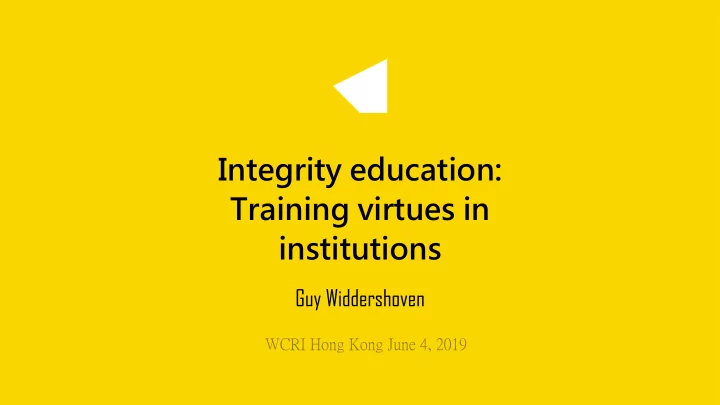

Integrity education: Training virtues in institutions Guy Widdershoven WCRI Hong Kong June 4, 2019
Coming up 1. Principles and virtues in research integrity 2. Training virtues 3. Training RI trainers in Europe: the VIRT2UE project 4. The Embassy of Good Science
Principles and virtues in research integrity
The European Code of Conduct for Reseach Integrity (ECoC) • Reliability • Honesty • Respect • Accountability
Principles and virtues • The four principles in the ECoC are not only abstract viewpoints enabling moral judgment of research behaviour • They are also virtues, which we expect researchers to embody in their everyday research practice • Being honest not only requires following the rules, but also implies a disposition to act in an honest way, valuing openness and trust in interpersonal relations
The Aristotelian concept of virtue Virtue is a disposition to act Courage (in combat) is the right middle between Virtue requires knowledge and cowardice and recklessness experience Honesty (in collaborative Virtue implies the ability to see research) is the right middle and realize the right middle between indirectness and between too much and too little bluntness
2 Training virtues
How to train virtues? • Raise awareness of the importance of research integrity issues: fabrication and falsification are wrong and detrimental • Foster reflection and joint deliberation on concrete experiences: when do I encounter morally difficult situations, and how do I learn the right way to act in such situations taking into account the perspective of others (where is the line between making results interesting and presenting results too nice?)
Example: PhD training in Amsterdam UMC • Blended learning: online course, face-to-face meetings, assignments • Core element of the face-to-face meetings: group reflection on dilemmas in daily practice
Moral case deliberation • Joint reflection on a concrete case of a trainee (prospective or retrospective) • Guided by a trained facilitator, following a structured method • Analysis of values and norms of stakeholders • Participants make a choice and make explicit underlying values and norms • Dialogue on differences, aiming at mutual understanding and learning
Relevance of moral case deliberation • Awareness of ethical issues and dilemmas • Better understanding of each other’s views • Richer perspective on the moral issue at stake • Insight in the right middle between extremes (taking the extremes seriously)
3 Training RI trainers in Europe: the VIRT2UE project
The VIRT2UE project H2020-SwafS start date June 2018 V irtue based ethics and I ntegrity of R esearch: T rain-the- T rainer program for U pholding the principles and practices of the European Code of Conduct for Research Integrity (VIRT2UE)
Goals Developing a sustainable train-the-trainer blended learning program enabling: • understanding and upholding the principles and practices of the European Code of Conduct for Research Integrity • contextualized ERI teaching across Europe • training 3050 trainers in Europe by the end of the project • building a community of ERI trainers
Blended learning program Face-to-face training Online component - Learning by doing - Background information (i.e. European Code of Conduct, ERI - Focus on real cases (own experience) issues, Virtues) - Facilitate group reflection on moral - Input for face-to-face training dilemmas in practice (learning goals, feedback forms, questions) - Focus how to apply the content of the teaching material to concrete situations in - Community of trainers (and daily practice trainees!)
What is the plan? Training the consortium members (30 Sept – Nov 2019 trainees) Spring 2020 The consortium members provide a VIRT2UE training (305 trainees) Fall 2020 The 305 trainers provide a VIRT2UE training (3050 trainees) End of project: may 2021
4 The Embassy of Good Science
H2020-SwafS start date May 2017 Initiative: wiki platform serving the research community • A platform that makes information about RE+RI easily accessible • Supports the application in research and evaluation • Involves all stakeholders in a participatory way • Achieves sustainability
Content: • Laws, Guidelines & Regulation • Cases & Scenarios • Themes • Q&A VIRT2UE • Education (Training materials) and… • Trainings
Experts and committees
Conclusions
Conclusions • RI education should promote virtues • Fostering virtues requires experience and reflection • Blended learning offers a basis for teaching virtues • VIRT2UE aims to engage a community of trainers and trainees • The Embassy of Good Science provides a platform for the research community, with trainers as ambassadors
Thank you!
The EnTIRE and VIRT2UE projects have received funding from the European Union’s Horizon 2020 research programme under grant agreements N 741782 and N 787580.
Recommend
More recommend